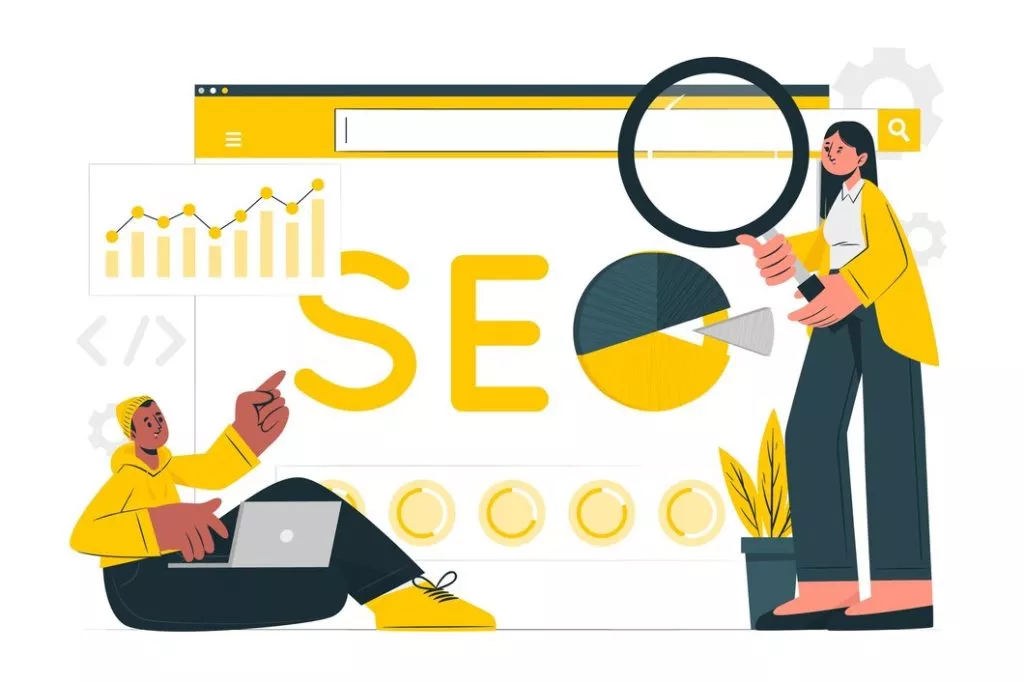In today’s digital age, local search engine optimization (SEO) has become absolutely paramount for businesses looking to thrive in a competitive marketplace. The growth of the internet and the widespread use of smartphones have fundamentally changed how consumers find and choose businesses. Statistics show that the vast majority of consumers rely on search engines like Google to discover local products and services. As an SEO agency, tapping into the demand for local SEO services can be highly rewarding. In this article, we will delve into the importance of local SEO and provide statistics to support the claim.
What is Local SEO?

Local SEO, or Local Search Engine Optimization, is a specialized practice within the broader field of SEO. It focuses on optimizing a business’s online presence to enhance its visibility in local search results. This means that when someone in your locality searches for a service or product that you offer, your business appears prominently in their search results. To develop a deep understanding of Local SEO, it’s crucial to familiarize yourself with the fundamental concepts. Google provides an excellent resource, their Guide to Local SEO, which offers insights into the key strategies and best practices for optimizing your online presence for local searches.
Why Local SEO Matters:
- Consumer Behavior: A significant number of consumers conduct online searches to find local businesses. According to a survey by BrightLocal, 97% of people searched online to find a local business in 2020.
- Mobile Usage: The increasing use of smartphones has amplified the need for local SEO. Google reported that mobile searches for phrases like “near me” or “close by” have grown by over 200% in recent years.
- Competitive Advantage: Implementing local SEO strategies can give businesses a competitive edge. Businesses that optimize their local listings and websites are more likely to appear in local search results, making it easier for customers to find them.
- Consumer Trust: Local businesses with positive online reviews and accurate information are more likely to gain the trust of potential customers. According to BrightLocal, 85% of consumers trust online reviews as much as personal recommendations.
- Foot Traffic: Local SEO isn’t just about online visibility. It also drives in-store visits. According to Google, 76% of people who search for something nearby on their smartphone visit a related business within a day, and 28% of those searches result in a purchase.
- Voice Search: The rise of voice-activated assistants like Siri and Alexa has further increased the need for local SEO. ComScore predicts that by 2020, 50% of all searches will be voice searches.
Statistics Supporting the Demand for Local SEO:
- Local Pack Searches: Google’s Local Pack, which appears at the top of local search results, includes three business listings. According to Moz, 44% of people click on a Local Pack listing, while only 8% click “More places.”
- Conversion Rates: Research by WordStream reveals that local searches have a 50% higher conversion rate compared to general searches. This means that local SEO can significantly improve a business’s ability to turn online searches into actual sales or leads.
- Google My Business (GMB): An optimized GMB listing is crucial for local SEO. Businesses with complete GMB profiles are 2.7 times more likely to be considered reputable by consumers, according to Google.
- Local SEO Impact: According to BrightLocal, 68% of consumers left a review for a local business after being asked, indicating the power of proactive local SEO strategies in managing and improving online reputation.
- Local SEO ROI: A survey conducted by Moz found that nearly 37% of local businesses found local SEO to be the most effective marketing channel, surpassing both organic search and social media.
- Mobile-First Indexing: With Google’s shift to mobile-first indexing, local SEO is even more crucial. Businesses that ensure their websites are mobile-friendly and load quickly can benefit from higher search rankings.
1. Target Market Research

Acquiring local SEO clients is not merely about providing services; it’s about understanding your market and offering tailored solutions. This process begins with thorough target market research. Google Keyword Planner and SEMrush are powerful tools for conducting keyword research, a crucial aspect of understanding your market. Google Keyword Planner allows you to explore keywords relevant to your niche and location. It provides data on search volume and competition, helping you identify high-impact keywords that potential clients are using to find services like yours. SEMrush, on the other hand, offers a comprehensive suite of tools for keyword analysis, competitor research, and more. To use it effectively, delve into SEMrush’s Guide to Keyword Research to understand how to find valuable keywords and how to leverage them to attract local clients effectively. Remember, thorough market research forms the bedrock of your local SEO strategy.
2. Building an Online Presence

A professional online presence is essential for attracting local SEO clients to your agency. Your website is often the first point of contact potential clients have with your business. WordPress is a widely recognized platform for building websites, renowned for its flexibility, ease of use, and a plethora of SEO-friendly themes and plugins. By choosing WordPress, you’re setting a solid foundation. To enhance your website’s SEO, consider integrating the Yoast SEO plugin. This plugin is a comprehensive tool that assists with on-page optimization, provides guidance on content readability and keyword targeting, and generates XML sitemaps to make your site more search engine-friendly. For detailed insights on optimizing your website using Yoast SEO, refer to their official guide. With a professional website and the right SEO tools, you’re well on your way to establishing a solid online presence that resonates with local clients.
3. Content Creation

Content creation is the lifeblood of your local SEO strategy. High-quality content serves a dual purpose: it informs and engages your audience while also making your website more appealing to search engines. Well-optimized content is the cornerstone of attracting local SEO clients. When creating content, ensure it’s aligned with the needs and interests of your target audience. Additionally, make sure it’s well-optimized for SEO. Tools like Grammarly are indispensable for proofreading and enhancing the quality of your content. Grammarly checks for grammar and spelling errors, suggests improvements, and ensures your content is well-polished. Furthermore, it offers a browser extension to help you proofread content across the web. To make your content visually appealing and more engaging, Canva is a fantastic resource. It provides a user-friendly platform for creating graphics, infographics, and other visuals that can complement your written content. Explore Grammarly and Canva to harness the power of these tools for elevating your content creation efforts, making your website an irresistible resource for local clients seeking valuable information and services.
4. Leveraging Social Media

Social media is a pivotal channel for engaging with potential local SEO clients. Platforms like Facebook, Twitter, Instagram, and LinkedIn offer vast opportunities to connect with your target audience. To streamline your social media efforts, consider using tools like Buffer. Buffer is a powerful social media management platform that simplifies the process of scheduling posts, curating content, and analyzing performance metrics. It enables you to maintain a consistent online presence, engage with your audience at the right times, and gain insights into which content resonates with your followers. By harnessing the capabilities of Buffer, you can effectively leverage social media as a tool for client engagement, ultimately attracting local clients who are looking for your expertise and services.
5. Local SEO Techniques

Local SEO techniques are the core building blocks of attracting local clients to your agency. These techniques encompass both on-page and off-page strategies. To optimize your website for local search, consider utilizing tools like Moz and Ahrefs. Moz offers a range of SEO tools and resources, including a comprehensive keyword research tool, backlink analysis, and on-page optimization advice. Ahrefs, on the other hand, is renowned for its backlink analysis capabilities and in-depth keyword research tools. By mastering these platforms, you can conduct precise keyword research, identify opportunities for backlink building, and refine your on-page SEO. These tools are invaluable for understanding how local search algorithms work and tailoring your website’s content to meet local clients’ needs and expectations. Whether it’s optimizing your site structure, meta tags, or creating content that resonates with your local audience, Moz and Ahrefs can be your trusted allies in this endeavor.
6. Networking and Outreach

Building strong relationships is the lifeblood of attracting local SEO clients. Professional networking platforms like LinkedIn provide the ideal environment to connect with potential clients and industry peers. LinkedIn is a powerful platform where professionals from various industries come together. It allows you to showcase your agency’s expertise and engage in meaningful conversations with potential clients. Join relevant groups and participate in discussions, publish informative articles, and create a compelling LinkedIn profile that highlights your agency’s strengths and the value you offer to local businesses. By utilizing LinkedIn and other professional networks, you can effectively extend your outreach and build relationships with local clients who may be in need of your SEO services. Networking is an essential component of client acquisition, and platforms like LinkedIn provide the perfect stage for these interactions.
7. Offering Free Audits

Providing free SEO audits is a compelling lead generation strategy that can attract local clients seeking your expertise. Tools like Screaming Frog can assist in performing comprehensive website audits. Screaming Frog is a versatile tool that crawls websites, identifying SEO issues and opportunities. By offering free audits, you demonstrate your agency’s commitment to transparency and expertise. Prospective clients are likely to appreciate the value provided through a free audit and may be more inclined to explore your services further. The insights generated by Screaming Frog can help you pinpoint critical areas for improvement on potential clients’ websites, making your pitch more targeted and convincing. This approach not only serves as a lead generation strategy but also positions your agency as a trusted and knowledgeable source in the world of local SEO, driving local businesses to seek your services for their online growth.
8. Local Directories and Citations

In the realm of local SEO, local directories and citations are fundamental components of your strategy. They help establish your business’s online presence and boost its visibility in local search results. To simplify the management of these critical elements, consider utilizing BrightLocal. BrightLocal is a specialized platform designed for local search optimization. It streamlines the process of managing your business information across various online directories and citation platforms. By ensuring your business information is consistent and up-to-date across these channels, you enhance your credibility with search engines and, in turn, improve your local search rankings. BrightLocal offers features like local citation tracking and management, review monitoring, and auditing to help you maintain a strong online presence in the local landscape. By incorporating BrightLocal into your local SEO strategy, you can save time and resources while ensuring that your business information is correctly represented across the web.
9. Client Testimonials and Case Studies

Building trust with potential local SEO clients is pivotal to your agency’s success. One effective way to do this is through the use of client testimonials and compelling case studies. Encourage satisfied clients to leave reviews on platforms like Trustpilot. These reviews serve as valuable endorsements of your services, making your agency more attractive to potential clients who are seeking a reputable partner for their SEO needs. Additionally, case studies are powerful tools for showcasing your expertise and the real-world results you’ve achieved for clients. By creating in-depth case studies, you can provide prospective clients with a detailed understanding of your agency’s capabilities and how you’ve positively impacted other businesses. These testimonials and case studies demonstrate your agency’s competence and the tangible benefits you bring to the table, ultimately making you a more appealing choice for local clients in need of SEO services.
10. Local SEO Packages

Transparency is the cornerstone of attracting clients to your local SEO agency. Potential clients seek clear information about the services you offer and their associated costs. To meet this need, it’s crucial to ensure your agency’s website features a transparent pricing page that outlines your services and their costs. By providing an upfront view of your pricing structure, you instill trust and confidence in potential clients. They appreciate knowing what they can expect in terms of services and investment. Additionally, transparent pricing simplifies the decision-making process for potential clients, as they can quickly determine whether your services align with their budget and needs. Be sure to detail the various packages or services you offer, along with their respective features and pricing. By openly presenting your pricing, you set a strong foundation for building trust with local clients, helping them make informed decisions regarding their SEO requirements.
11. Monitoring and Reporting

Client satisfaction and confidence in your services often hinge on your ability to track and report on the progress of your SEO efforts. The tools provided by Google Analytics and Google Search Console are essential for this purpose. Google Analytics offers a comprehensive suite of tracking and reporting tools that enable you to monitor website traffic, user behavior, and the success of your SEO campaigns. By analyzing this data, you can fine-tune your strategies, optimize your content, and demonstrate the concrete results you’re achieving for your clients. Google Search Console, on the other hand, provides insights into how Google views your website, allowing you to identify and resolve potential issues. These tools empower you to present data-backed progress reports to your clients, assuring them that your efforts are delivering measurable results. The combination of Google Analytics and Google Search Console ensures that you can continuously monitor the performance of your SEO campaigns and showcase your agency’s ability to drive success for local clients.
12. Paid Advertising

Paid advertising is a strategic complement to your organic SEO efforts, enabling your agency to expand its reach and engage a broader audience through targeted campaigns. Platforms like Google Ads and Facebook Ads are powerful tools for executing these campaigns. Google Ads, for instance, allows you to create highly targeted advertisements that appear in Google’s search results, on websites, and within mobile apps. The platform offers a variety of advertising formats, including text ads, display ads, and video ads. By effectively utilizing Google Ads, you can position your agency in front of local clients who are actively searching for services like yours. Similarly, Facebook Ads provides a rich ecosystem for reaching specific demographics and interests. Through detailed targeting options, you can tailor your ads to connect with local audiences interested in your services. Paid advertising offers you a dynamic and versatile means of expanding your client base and achieving your local SEO goals.
13. Partnerships and Referrals

Partnerships and referrals are potent strategies for client acquisition. Consider forming partnerships with businesses that complement your services. For instance, if you offer SEO services, partnering with a web design agency can be mutually beneficial. Such partnerships allow you to tap into their client base while offering added value to their services. Moreover, implementing a referral program within your agency can encourage your existing clients to recommend your services. Rewarding clients for successful referrals not only fosters goodwill but also amplifies your agency’s reach. For instance, Dropbox’s “Refer a Friend” program rewarded users with extra storage space for each successful referral, leading to significant growth. By nurturing these relationships, you expand your network and open doors to potential clients who come with an established level of trust. Building a network of partners and encouraging referrals can be instrumental in the growth of your local SEO agency.
Closing the Deal

Effectively closing deals with potential clients is a pivotal stage in the client acquisition process. It necessitates professionalism, clarity in communication, and the use of secure and efficient contract signing tools like DocuSign. This platform simplifies the process of creating, sending, and signing contracts and agreements, making it convenient for both your agency and the client. Professionalism is key during client negotiations, and clear communication ensures that all terms, expectations, and deliverables are well-understood. Provide clients with a well-structured proposal that outlines the scope of work, timelines, and pricing in detail. Ensure that any questions or concerns are addressed promptly, building trust and confidence. Once all parties are satisfied, utilize DocuSign to facilitate secure and swift contract signing. By streamlining this final step, you present your agency as organized and efficient, leaving a positive impression on the client. Effective deal-closing not only results in new clients but also sets the stage for a fruitful and productive partnership, with both parties clear on their roles and responsibilities. DocuSign, as a trusted e-signature tool, ensures the contractual aspect is a seamless and secure process in your client acquisition journey.
Conclusion:
In the competitive landscape of local SEO, attracting and acquiring clients requires a well-thought-out approach that encompasses various aspects of the business. As a local SEO expert, understanding the fundamentals of local SEO, identifying your target audience, and building a robust online presence are foundational steps. These, in turn, pave the way for attracting clients through valuable content, leveraging testimonials and case studies, offering transparent packages, and providing detailed monitoring and reporting.
Your success in acquiring and retaining local SEO clients depends not only on your technical skills but also on your ability to communicate, deliver results, and foster long-term relationships. By consistently providing value and demonstrating your expertise, you can position yourself as the go-to choice for local businesses seeking SEO services.
FAQs on Local SEO Clients:
How can I identify my target audience for local SEO services?
To identify your target audience, conduct market research, analyze existing clients, create buyer personas, conduct surveys and interviews, and analyze competitors. Understanding the needs, pain points, and preferences of your target audience is essential for tailoring your services effectively.
How can client testimonials and case studies be leveraged to build trust with potential clients?
Client testimonials serve as endorsements of your services, and positive reviews on platforms like Trustpilot can significantly impact your credibility. Case studies, on the other hand, provide real-world examples of your success, showcasing your competence and the concrete benefits you bring to clients.
Why is transparency in pricing important for local SEO services?
Transparency in pricing is essential as it allows potential clients to understand the cost of services and make informed decisions. By openly presenting your pricing, you build trust and simplify the decision-making process for clients.
What role does monitoring and reporting play in retaining local SEO clients?
Monitoring and reporting using tools like Google Analytics and Google Search Console demonstrate the results of your SEO efforts to clients. It provides them with tangible evidence of the value you provide, builds trust, and secures long-term partnerships.
What are some key strategies for acquiring and retaining local SEO clients?
Key strategies include providing valuable content, leveraging testimonials and case studies, offering transparent pricing packages, and ensuring effective monitoring and reporting. Additionally, maintaining professionalism, delivering results, and adapting to evolving client needs are vital for client retention.



